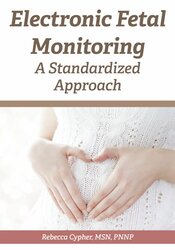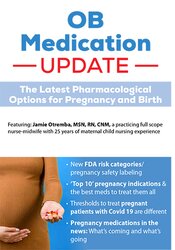- Understand the examination including cost, testing time, and passing requirements.
- Apply knowledge of maternal-fetal assessment methods when selecting electronic fetal monitoring or intermittent auscultation to evaluate fetal status.
- Interpret data from the electronic fetal monitor to differentiate between actual fetal data and equipment failure.
- Use knowledge of the advantages and disadvantages of electronic fetal monitoring to provide information to the pregnant patient and her support person(s).
- Apply knowledge of fetal heart rate regulation to the interpretation of electronic fetal monitoring data.
- Identify and interpret the significance of fetal heart rate patterns.
- Interpret data from electronic fetal monitoring to differentiate between normal and abnormal fetal heart rate patterns.
- Apply knowledge of common pregnancy complications to the development of a comprehensive plan of care based on Electronic fetal monitoring data.
- Apply knowledge of uteroplacental and maternal-fetal physiology as they relate to fetal oxygenation.
- Identify indications for adjunct fetal assessment and incorporate findings into the plan of care.
- Incorporate knowledge of current practice and legal practices into nursing care.
Preparation for the exam has just become easier and more effective!
As a labor and delivery clinician, you have not one, but two patients. The journey from pregnancy to postpartum can be long and challenging for a mother-to-be... as she is progressing in labor, she is counting on your expertise to make this experience as safe as possible. Electronic fetal monitoring is a key component of providing this care!
The EFM Review course provides a comprehensive and up-to-date review of electronic fetal monitoring based on the C-EFM® exam outline. Gain the information you need to be successful on the exam and to enhance clinical practice.
In this certification review, expert Kim Murphy, MS, APRN-CNP, RNC-OB, RNC-MNM, WHNP-BC, C-EFM, will equip you with all the clinical and professional issues covered according to the current exam blueprint, so you will pass the first time. Plus, you'll gain valuable test-taking strategies and tips — including an exclusive practice exam — that are certain to aid in your quest for success on the Electronic Fetal Monitoring certification exam!
With the addition of C-EFM to your credentials, you will be able to demonstrate to your patients, employers, and peers that you have the knowledge and skills needed to accurately monitor fetal heart tracings.
- Learn at your own pace...from your own computer
- No cramming, no stress, no fear
- Lots of practice monitoring strips
- Relevance to your everyday work challenges
- Practice questions you can take over and over
- Most importantly... exam success!
Click here for Credit details | Click here for course objectives and outline
- No matter what stage you are in your career, it's time for you to take the next step.
- Learn an incredible skill to be able to take care of the external laboring woman and… the hidden, internal baby.
- Become proficient with the most current electronic fetal monitoring recommendations, language, and definitions!
- Hold yourself to a nationally recognized standard!
- Gain confidence in what you can see about fetal heart tracing so you can provide the best care to the invisible and visible patient.
- Work effectively as a team, using a systematic approach to identify and manage clinical situations, caring for two patients at a time.
- Prep for the Certification for Electronic Fetal Monitoring exam and pass the first time!
Maternal-fetal safety is of the utmost importance…and electronic fetal monitoring is an important tool to ensure safety and positive outcomes for both mother and baby. When clinicians are not current in fetal monitoring, there is a risk for adverse maternal and neonatal outcomes.
When you are nationally certified in EFM you understand what the baby is communicating by using your special knowledge to assess the fetal condition — especially during labor.
Expand your fetal monitoring clinical skills with PESI's EFM Certification Review. During this course, you will learn everything you need to know about fetal monitoring and gain the information you need to be successful on the exam and to enhance clinical practice.
Fully prepare to pass the EFM certification exam! This comprehensive EFM certification exam prep course offers the knowledge you need to pass the NCC® Certified EFM Nurse exam and get certified!
- Fetal heart rate pattern interpretation and management
- EFM documentation utilizing NICHD terminology
- Fetal assessment testing
- Comprehensive review following the current test blueprint
You will increase your ability to interpret data and care for your families, enhancing the outcomes for mothers and newborns. You will also gain valuable test-taking strategies and tips that are certain to aid in your quest for success on the Certified EFM Nurse exam!
Certification Exam Prep Package Includes:
- Self-Study Package… 6 hours of review
- Comprehensive course manual
- Practice questions to assess your readiness to sit for the actual exam
- Practice exam
- Plus, three bonus courses for further reference and additional continuing education
Click here for Credit details | Click here for course objectives and outline

Kim has worked in Level I and Level III institutions, along with providing women's health services in both the private office and public health settings. Kim is on staff at Poling Law in Columbus, OH, as their obstetrical and women's health legal nurse consultant, working with attorneys across the country on legal issues.
Click here for information about Kim Murphy
- Course and Exam Overview and Test-Taking
- Exam Eligibility
- Exam Content
- Competency Statements
- Study Resources
- Scoring
- Fetal Assessment Technique
- Electronic Monitoring Equipment
- External and Internal
- Artifact
- Signal Ambiguity
- Failure
- Troubleshooting
- FHR Pattern Recognition, Dysrhythmias, and Other Variant Patterns
- Fetal Heart Rate Baseline
- Fetal Heart Rate Variability
- Abnormal Uterine Activity
- Study Resources
- Fetal Dysrhythmias
- Pregnancy Complications and Effect on Fetal Heart Patterns
- Maternal Complications
- Uteroplacental Complications
- Fetal Complications
- Fetal Heart Rate Acceleration
- Fetal Heart Rate Decelerations
- Normal Uterine Activity
- Adjunct Methods of Fetal Surveillance
- Auscultation
- Fetal Movement and Stimulation
- Nonstress Testing
- Biophysical Profile
- Cord Blood
- Acid-Base Balance
- Professional Issues
- Legal
- Ethics
- Patient Safety
- Quality Improvement
Click here for Credit details | Click here for course objectives and outline

Rebecca Cypher, MSN, PNNP | Click here for information about Rebecca Cypher
Enhance your obstetric practice with our comprehensive course on intrapartum care, addressing critical uncertainties in fetal monitoring, interpretation, and decision-making. Stay at the forefront of maternal-fetal safety, ensuring optimal outcomes through continuous learning and the latest research in perinatal care.

Sandra Asanjarani, RNC-OB, MS, NPWH, C-EFM | Click here for information about Sandra Asanjarani
Pregnancy-related sepsis is a life-threatening infection that can take place anytime during pregnancy. Fast recognition and treatment of sepsis is key, which means you need to know the signs and symptoms of sepsis in pregnancy, as well as how to screen for sepsis early and initiate treatment.

Jamie Otremba, MSN, RN, CNM | Click here for information about Jamie Otremba
Hear the latest evidence on over-the-counter products that patients are using, hemorrhagic prevention, and the best meds to treat the 'Top 10' pregnancy indications you may encounter.
We’re that confident you'll find this learning experience to be all that's promised and more than you expected.
Click here for Credit details | Click here for course objectives and outline

